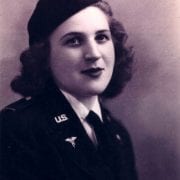She thought she was “hardly worth mentioning”
By Joel Michaels
Gladys L. Lonstein-Gaman, a member of our country’s “greatest generation,” recently passed away, just two weeks shy of her 100th birthday. She served in the United States Army Nurse Corps during World War II (1943 -1946), where she was assigned to the 121st Station Hospital in Braintree, England. After the War, she lived most of her life in Peabody, Massachusetts where she raised her family. Her two sons, Steven and Philip, survive her. I am Gladys’ nephew.
Gladys came from a modest background in Worcester, Massachusetts, where she lived with her two sisters and younger brother. She was an unassuming woman who did not seek recognition for her military service. During an interview in 2004 by the Veterans History Project, her first inclination was to diminish the extent of her contributions to the War effort. When asked why she enlisted as a nurse at age 24, she said “I had to be a part of it in some small way” and nursing was the only way she could make a contribution. She went on to say that “my involvement seemed so small to me” as she compared it to the many young men who saw combat and thought it was “hardly worth mentioning.”
Like many American Jews who served in World War II, Gladys gave two reasons for her service. The first was the protection of America, as she concluded that if “England had been taken over by the Nazis, we would have been next.” The second was to “help my people who were being persecuted in the concentration camps.” Supporting American soldiers in the field was how Gladys perceived she could best provide some outreach to her fellow Jews who were victims of the Holocaust. Her remarks provide context for why a young Jewish girl from Worcester left for New York alone to enlist and go on to England to face an uncertain future during a most troubled time.
Although Gladys saw her contributions as a member of the Army Nurse Corps as small, not all saw it that way. One night, while on duty at the hospital in England, Gladys experienced the impact of a German warplane’s bomb. After she emerged from the rubble and from under the desk she used for cover, she saw the significant damage surrounding her. Gladys immediately directed her attention to ensuring the safety and health of the patients in the ward. Her response and actions that day were the subject of a Major’s letter of commendation, which affirmed that “under extremely hazardous conditions, Second Lieutenant Lonstein did calmly and efficiently carry out the necessary work of attending to the patients in the ward.” Gladys explained her reactions that night by saying that she probably was “too dumb to be scared” and “all I knew was that I had to get the patients to a safe place.”
Since World War II, the role of women in the American military continues to evolve. Some of this change can be attributed to the actions of many women, including my aunt, who served in the Army Nurse Corps. Like their male counterparts, they too were fearless in ensuring that our country would not fail in defending its security and freedom for its citizens, while restoring peace throughout the world. To this day I remain in awe of the contributions they made.
Volume 71. Number 3. Fall 2017





Leave a Reply
Want to join the discussion?Feel free to contribute!